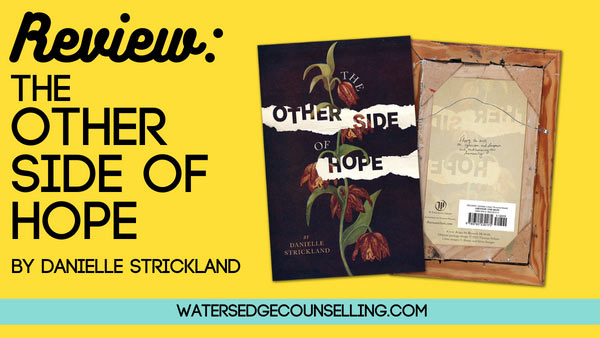
Is hope more than a tag line or a feel-good sentiment when we are feeling down? In her new book The Other Side of Hope, Danielle Strickland flips the narrative on despair and cynicism, asking us to embrace hope and heal from religious trauma.
Part story, part guide book, you literally flip this book upside down to go between narrative and theology – and while the divide may cause some discomfort, the juxtaposition makes both sides heroes in their own right.
From the get go, it’s essential you know this: Danielle is a minister, and so her stories and thoughts on hope all centre around her Christian belief system. Due to this, people with a robust spirituality will gravitate towards her work. Yet while being overt about her faith (Danielle literally tells us about a supernatural experience where she encountered Jesus in a prison cell), she speaks with a groundedness and a worldliness that comes from a life which has known much pain. It means people who have experienced church hurt or who don’t share the same Christian beliefs as her are still welcome at her proverbial table – almost as if she has invited the misfits and cynics to sit alongside her and call them her friends.
We enter hearing this book hearing story after story about how hope showed up in unexpected places. Danielle opens up about her own story, highlighting how a supernatural experience changed the course of her life. There are stories about the people Danielle met while pastoring in the most poverty stricken area of Vancouver; details about her time in Europe just months after the fall of Communism, and even a mind boggling scenario where she saw someone raised from the dead. And yet, she also shares an experience where a community prayed for someone and they weren’t raised for the dead – revealing how hope exists in both scenarios.
Anyone who has been in church for more than five minutes will have heard stories like this in the past. However, it is Danielle’s candor and yes, even cynicism, that makes the stories palpable. These aren’t just stories of victory. Like each of our lives, they are gritty, and imperfect, and filled with doubt and beauty, and grace and hope.
The stories alone will move you and drive home the emotional and spiritual truths of hope – that it exists in spite of pain, trauma and injustice, and also within the darkness of these. But once you flip the book and see the framework of hope, you are given the language to better understand what she shares. Danielle compares it to the back of an artwork, where the sound structure of board and frame hold up a masterpiece. And it is within this structure, that Danielle unravels theological mistruths and religious trauma that has led us to become cynics, isolated by pain, and content with a shallow version of hope found on bumper stickers.
She looks at the nature of humanity and our deep need for connection, highlighting how hope is eternal. And then later, she rewrites the interpretation many Christians have about being born inherently evil, which aides in religious trauma and spiritual abuse. Instead, she works to free the reader from shame, revealing how she believes God made humanity and showed us to be made worthy of his love in the beginning.
People who have experienced church hurt or religious trauma will find a home in Danielle’s words, because she lays out how historically how the western protestant church has culturally hyper-focused on sin in order to retain power and structure. Declaring, “Our life story and human story does not begin in sin,” she invites you to into a new understanding and experience of life and spirituality. Never straying from her Christian core beliefs, she reframes the harmful narratives many of have inherited, and shows how true experiences of hope, mean “we are being rescued from what we thought was true about God.”
I have read plenty of books about how to live a more fulfilling spiritual life. Yet, I have also read plenty of books that tap into an intangible, unidentifiable hope – whether it be through poetry, stories or mantras. Danielle has encapsulated both facets of the human experience in this book. Making it a powerful conduit for internal healing, and a welcome harbour for those who no longer fit into the framework a religious institution expects. This is potentially, Danielle’s most profound work yet.
The Other Side of Hope is available now at major bookstores and online.
Have you experienced spiritual abuse? Are you looking for a safe space to explore and understand your spiritulity? Contact Colleen on 0434 337 245 or Duncan on 0434 331 243 for a FREE 10 minute consultation on how we can best help you or book online now.